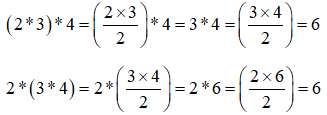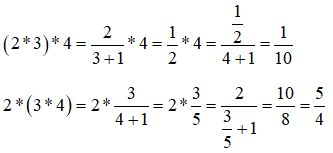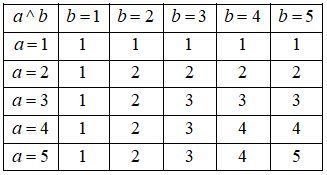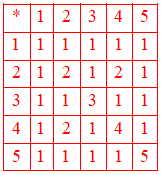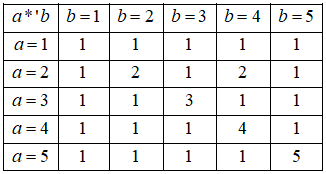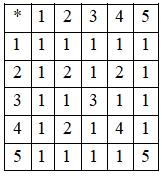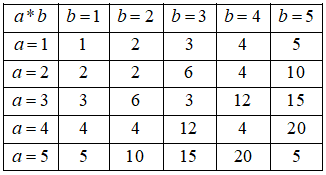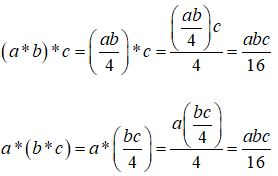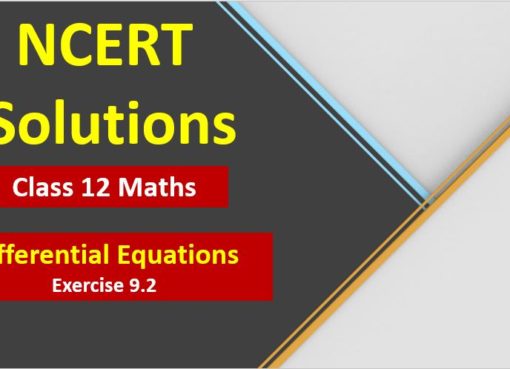NCERT Solutions for Class 12 Maths Relations and Functions
Hi Students, Welcome to Amans Maths Blogs (AMB). In this post, you will get the NCERT Solutions for Class 12 Maths Relations and Functions Exercise 1.4. This NCERT Solutions can be downloaded in PDF file. The downloading link is given at last.
NCERT Solutions for Class 12 Maths Relations and Functions Exercise 1.4
NCERT Solutions for Class 12 Maths Relations and Functions Exercise 1.4: Ques No 1.
Determine whether or not each of the definition of ∗ given below gives a binary operation. In the event that ∗ is not a binary operation, give justification for this.
(i) On Z+, define ∗ by a ∗ b = a – b
NCERT Solutions:
Given that ∗ defined by a ∗ b = a – b in Z+.
Since the image of (1, 2) under * is 1 * 2 = 1 − 2 = −1 ∉ Z+, the operation * is not a binary operation.
(ii) On Z+, define ∗ by a ∗ b = ab
NCERT Solutions:
Given that ∗ defined by a ∗ b = ab in Z+.
Since for each a, b ∈ Z+, * carries each pair (a, b) to a unique element a * b = ab in Z+, then the operation * is a binary operation.
(iii) On Z+, define ∗ by a ∗ b = ab2
NCERT Solutions:
Given that ∗ defined by a ∗ b = ab2 in R.
Since for each a, b ∈ R, * carries each pair (a, b) to a unique element a * b = ab2 in R, then the operation * is a binary operation.
(iv) On Z+, define ∗ by a ∗ b = |a – b|
NCERT Solutions:
Given that ∗ defined by a ∗ b = | a – b | in Z+.
Since for each a, b ∈ Z+, * carries each pair (a, b) to a unique element a * b = | a – b | in Z+, then the operation * is a binary operation.
(v) On Z+, define ∗ by a ∗ b = a
NCERT Solutions:
Given that ∗ defined by a ∗ b = a in Z+.
Since for each a, b ∈ Z+, * carries each pair (a, b) to a unique element a * b = a in Z+, then the operation * is a binary operation.
NCERT Solutions for Class 12 Maths Relations and Functions Exercise 1.4: Ques No 1.
For each binary operation ∗ defined below, determine whether ∗ is commutative or associative.
(i) On Z+, define ∗ by a ∗ b = a – b
NCERT Solutions:
Given that ∗ defined by a ∗ b = a – b in Z.
Let a = 2, b = 3 in Z. Then,
2 * 3 = 2 – 3 = – 1 and 3 * 2 = 3 – 2 = 1
We get that 2 * 3 ≠ 3 * 2
Thus, the given operation * is not commutative.
Let a = 2, b = 3, c = 4 in Z. Then,
(2 * 3) * 4 = (2 – 3) * 4 = – 1 * 4 = – 1 – 4 = –5
2 * (3 * 4) = 2 * (3 – 4) = 2 * –1 = 2 – (–1) = 2 + 1 = 3
We get that (2 * 3) * 4 ≠ 2 * (3 * 4)
Thus, the given operation * is not associative.
(ii) On Z+, define ∗ by a ∗ b = ab + 1
NCERT Solutions:
Given that ∗ defined by a ∗ b = ab + 1 in Q.
Let a = 2, b = 3 in Q. Then,
2 * 3 = 2×3 + 1 = 6 + 1 = 7 and 3 * 2 = 3×2 + 1 = 6 + 1 = 7
We get that 2 * 3 = 3 * 2
Thus, the given operation * is commutative.
Let a = 2, b = 3, c = 4 in Q. Then,
(2 * 3) * 4 = (2×3 + 1) * 4 = 7 * 4 = 7×4 + 1 = 29
2 * (3 * 4) = 2 * (3×4 + 1) = 2 * 13 = 2×13 + 1 = 27
We get that (2 * 3) * 4 ≠ 2 * (3 * 4)
Thus, the given operation * is not associative.
(iii) On Z+, define ∗ by a ∗ b = ab/2
NCERT Solutions:
Given that ∗ defined by a ∗ b = ab/2 in Q.
Let a = 2, b = 3 in Q. Then, 2 * 3 = (2 × 3)/2 = 3 and 3 * 2 = (3 × 2) / 2 = 3
We get that 2 * 3 = 3 * 2. Thus, the given operation * is commutative.
Let a = 2, b = 3, c = 4 in Q. Then,
We get that (2 * 3) * 4 = 2 * (3 * 4). Thus, the given operation * is associative.
(iv) On Z+, define ∗ by a ∗ b = 2ab
NCERT Solutions:
Given that ∗ defined by a ∗ b = 2ab in Z+.
Let a = 2, b = 3 in Z. Then, 2 * 3 = 2(2×3) = 26 = 64 and 3 * 2 = 2(3×2) = 26 = 64
We get that 2 * 3 = 3 * 2. Thus, the given operation * is commutative.
Let a = 2, b = 3, c = 4 in Z+. Then,
(2 * 3) * 4 = 2(2×3) * 4 = 64 * 4 = 2(64×4) = 2256
2 * (3 * 4) = 2 * 2(3×4) = 2 * 4096 = 2(2×4096) = 28192
We get that (2 * 3) * 4 ≠ 2 * (3 * 4)
Thus, the given operation * is not associative.
(v) On Z+, define ∗ by a ∗ b = ab
NCERT Solutions:
Given that ∗ defined by a ∗ b = ab in Z+.
Let a = 2, b = 3 in Z. Then, 2 * 3 = 23 = 8 and 3 * 2 = 32 = 9
We get that 2 * 3 ≠ 3 * 2. Thus, the given operation * is not commutative.
Let a = 2, b = 3, c = 4 in Z+. Then,
(2 * 3) * 4 = 23 * 4 = 8 * 4 = 84 = 4096 = 212
2 * (3 * 4) = 2 * 34 = 2 * 81 = 281
We get that (2 * 3) * 4 ≠ 2 * (3 * 4). Thus, the given operation * is not associative.
(vi) On Z+, define ∗ by a ∗ b = a/(b + 1)
NCERT Solutions:
Given that ∗ defined by a ∗ b = a/(b + 1) in R – {–1}.
Let a = 2, b = 3 in R – {–1}. Then, 2 * 3 = 2/(3 + 1) = ½ and 3 * 2 = 3/(2 + 1) = 1
We get that 2 * 3 ≠ 3 * 2. Thus, the given operation * is not commutative.
Let a = 2, b = 3, c = 4 in R – {–1}. Then,
NCERT Solutions for Class 12 Maths Relations and Functions Exercise 1.4: Ques No 3.
Consider the binary operation ∧ on the set {1, 2, 3, 4, 5} defined by a ∧ b = min {a, b}. Write the operation table of the operation ∧.
NCERT Solutions:
Given that the binary operation ∧ on the set {1, 2, 3, 4, 5} defined by a ∧ b = min {a, b}.
Thus, the operation table for the given operation is as below.
NCERT Solutions for Class 12 Maths Relations and Functions Exercise 1.4: Ques No 4.
Consider the binary operation ∧ on the set {1, 2, 3, 4, 5} is given by following multiplication table.
(i) Compute (2 ∗ 3) ∗ 4 and 2 ∗ (3 ∗ 4)
NCERT Solutions:
From the given table, we have 2 * 3 = 1, 1 * 4 = 1, 3 * 4 = 1 and 2 * 1 = 1. Thus, (2 * 3) = 1 * 4 = 1 and 2 * (3 * 4) = 2 * 1 = 1.
(ii) Is * commutative?
NCERT Solutions:
For every a, b ∈ {1, 2, 3, 4, 5}, we have a * b = b * a. Therefore, the operation * is commutative.
(iii) Compute (2 ∗ 3) ∗ (4 ∗ 5).
NCERT Solutions:
From the given table, we have 2 * 3 = 1, 4 * 5 = 1, and 1 * 1 = 1. Thus, (2 * 3) * (4 * 5) = 1 * 1 = 1.
NCERT Solutions for Class 12 Maths Relations and Functions Exercise 1.4: Ques No 5.
Let ∗′ be the binary operation on the set {1, 2, 3, 4, 5} defined by a ∗′ b = H.C.F. of a and b. Is the operation ∗′ same as the operation ∗ defined in Exercise 4 above? Justify your answer.
NCERT Solutions:
Given that the binary operation ∗′ on the set {1, 2, 3, 4, 5} defined by a ∗′ b = HCF of a and b.
Thus, the operation table for the given operation ∗′ is as below.
In the question no 4, the operation table for the given operation ∗ is as below.
We observe that the operation tables for the operations * and *′ are the same. Thus, the operation *′ is same as the operation*.
NCERT Solutions for Class 12 Maths Relations and Functions Exercise 1.4: Ques No 6.
Let ∗ be the binary operation on N given by a ∗ b = L.C.M. of a and b.
(i) Find 5 ∗ 7, 20 ∗ 16
NCERT Solutions:
Given that the binary operation on N given by a ∗ b = L.C.M. of a and b.
Thus, 5 * 7 = LCM of 5 and 7 = 35 and 20 * 16 = LCM of 20 and 16 = 80
(ii) Is * commutative?
NCERT Solutions:
Given that the binary operation on N given by a ∗ b = L.C.M. of a and b
Since LCM of (a, b) and LCM of (b, a) is same for all N, then a ∗ b = b * a
Thus, the given operation * is commutative.
(iii) Is * associative?
NCERT Solutions:
Given that the binary operation on N given by a ∗ b = L.C.M. of a and b
We have
(a * b) * c = (L.C.M of a and b) * c = LCM of a, b, and c
a * (b * c) = a * (LCM of b and c) = L.C.M of a, b, and c
Thus, (a * b) * c = a * (b * c).
Hence, the given operation * is associative.
(iv) Find the identity of * in N.
NCERT Solutions:
Given that the binary operation on N given by a ∗ b = L.C.M. of a and b
Since LCM of (a, 1) and LCM of (1, a) is same for all N and that is 1,
then a ∗ 1 = 1 * a = LCM of a and 1 = a
Thus, 1 is the identity of the given operation *.
(v) Which elements of N are invertible for the operation ∗?
NCERT Solutions:
Given that the binary operation on N given by a ∗ b = L.C.M. of a and b
An element a in N is invertible with respect to the operation * if there exists an element b in N, such that a * b = c = b * a.
Thus, we have c = 1
This means that L.C.M of a and b = 1 = L.C.M of b and a. This case is possible only when a and b are equal to 1.
Thus, 1 is the only invertible element of N with respect to the operation *.
NCERT Solutions for Class 12 Maths Relations and Functions Exercise 1.4: Ques No 7.
Is ∗ defined on the set {1, 2, 3, 4, 5} by a ∗ b = L.C.M. of a and b a binary operation? Justify your answer.
NCERT Solutions:
Given that ∗ defined on the set {1, 2, 3, 4, 5} by a ∗ b = L.C.M. of a and b
Thus, the operation table for the given operation ∗ is as below.
From the table, we observe that 6, 10, 12, 15, 20 ∉ A. Thus, the given operation * is not a binary operation.
NCERT Solutions for Class 12 Maths Relations and Functions Exercise 1.4: Ques No 8.
Let ∗ be the binary operation on N defined by a ∗ b = H.C.F. of a and b. Is ∗ commutative? Is ∗ associative? Does there exist identity for this binary operation on N?
NCERT Solutions:
Given that ∗ is the binary operation on N defined by a ∗ b = H.C.F. of a and b.
We know that H.C.F. of a and b = H.C.F. of b and a for all a, b ∈ N.
Thus, we get a * b = b * a. Hence, the given operation * is commutative.
For a, b, c ∈ N, we have
(a * b) * c = (H.C.F. of a and b) * c = H.C.F. of a, b and c
a *(b * c) = a *(H.C.F. of b and c) = H.C.F. of a, b, and c
Thus, we get (a * b) * c = a * (b * c). Hence, the given operation * is associative.
Now, an element e ∈ N will be the identity for the operation * if a * e = a = e* a for all a ∈ N. But this relation is not true for any a ∈ N.
Thus, the given operation * does not have any identity in N.
NCERT Solutions for Class 12 Maths Relations and Functions Exercise 1.4: Ques No 9.
Let ∗ be a binary operation on the set Q of rational numbers as follows: Find which of the binary operations are commutative and which are associative.
(i) a * b = a – b
NCERT Solutions:
Given that ∗ be a binary operation as a ∗ b = a – b
Since a – b ≠ b – a, then a * b ≠ b * a. Thus, the given operation a ∗ b = a – b is not commutative.
For a, b, c, we have, (a * b) * c = (a – b) * c = (a – b) – c = a – b – c
a * (b * c) = a * (b – c) = a – (b – c) = a – b + c
Since a – b – c ≠ a – b + c, then (a * b) * c ≠ a * (b * c).
Thus, the given operation a ∗ b = a – b is not associative.
(ii) a * b = a2 + b2
NCERT Solutions:
Given that ∗ be a binary operation as a ∗ b = a2 + b2
Since a2 + b2 = b2 + a2, then a * b = b * a
Thus, the given operation a ∗ b = a2 + b2 is commutative.
For a, b, c, we have
(a * b) * c = (a2 + b2) * c = (a2 + b2)2 + c2
a * (b * c) = a * (b2 + c2) = a2 + (b2 + c2)2
Since (a2 + b2)2 + c2 ≠ a2 + (b2 + c2)2, then (a * b) * c ≠ a * (b * c).
Thus, the given operation a ∗ b = a2 + b2 is not associative.
(iii) a * b = a + ab
NCERT Solutions:
Given that ∗ be a binary operation as a ∗ b = a + ab
Since a + ab ≠ b + ba, then a * b ≠ b * a
Thus, the given operation a ∗ b = a + ab is not commutative.
For a, b, c, we have
(a * b) * c = (a + ab) * c = a + ab + (a + ab)c = a + ab + ac + abc
a * (b * c) = a * (b + bc) = a + a(b + bc) = a + ab + abc
Since a + ab + ac + abc ≠ a + ab + abc, then (a * b) * c ≠ a * (b * c).
Thus, the given operation a ∗ b = a + ab is not associative.
(iv) a * b = (a – b)2
NCERT Solutions:
Given that ∗ be a binary operation as a ∗ b = (a – b)2
Since (a – b)2 = (b – a)2, then a * b = b * a
Thus, the given operation a ∗ b = (a – b)2 is commutative.
For a, b, c, we have
(a * b) * c = (a – b)2 * c = ((a – b)2 – c)2
a * (b * c) = a * (b – c)2 = (a – (b – c)2)2
Since ((a – b)2 – c)2 ≠ (a – (b – c)2)2, then (a * b) * c ≠ a * (b * c).
Thus, the given operation a ∗ b = (a – b)2 is not associative.
(v) a * b = ab/4
NCERT Solutions:
Given that ∗ be a binary operation as a ∗ b = ab/4
Since ab/4 = ba/4, then a * b = b * a
Thus, the given operation a ∗ b = ab/4 is commutative.
For a, b, c, we have
Since abc/16 = abc/16, then (a * b) * c = a * (b * c). Thus, the given operation a ∗ b = ab/4 is associative.
(vi) a * b = ab2
NCERT Solutions:
Given that ∗ be a binary operation as a ∗ b = ab2
Since ab2 ≠ ba2, then a * b ≠ b * a
Thus, the given operation a ∗ b = ab2 is not commutative.
For a, b, c, we have
(a * b) * c = (ab2) * c = ab2c2
a * (b * c) = a * (bc2) = a(bc2)2 = ab2c4
Since ab2c2 ≠ ab2c4, then (a * b) * c ≠ a * (b * c).
Thus, the given operation a ∗ b = ab2 is not associative.
NCERT Solutions for Class 12 Maths Relations and Functions Exercise 1.4: Ques No 10.
Show that none of the operations given above has identity.
NCERT Solutions:
We know that if a * e = a = e * a for all a ∈ Q, then the element e ∈ Q will be the identity element for the operation *.
However, there is no such element e ∈ Q with respect to each of the six operations given in question no 9.
Thus, none of the six operations in question 9 has identity.
NCERT Solutions for Class 12 Maths Relations and Functions Exercise 1.4: Ques No 11.
Let A = N × N and ∗ be the binary operation on A defined by (a, b) ∗ (c, d) = (a + c, b + d). Show that ∗ is commutative and associative. Find the identity element for ∗ on A, if any.
NCERT Solutions:
Given that A = N × N and ∗ be the binary operation on A defined by
(a, b) ∗ (c, d) = (a + c, b + d).
For a, b, c, d ∈ N, we have
(a, b) ∗ (c, d) = (a + c, b + d) and (c, d) * (a, b) = (c + a, d + b) = (a + c, b + d)
Since (a + c, b + d) = (a + c, b + d), then (a, b) ∗ (c, d) = (c, d) * (a, b)
Thus, the given operation (a, b) ∗ (c, d) = (a + c, b + d) is commutative.
For a, b, c, d, e, f ∈ N, we have
{(a, b) ∗ (c, d)} * (e, f) = {a + c, b + d} * (e, f) = (a + c + e, b + d + f)
And,
(a, b) ∗ {(c, d) * (e, f)} = (a, b) * {c + e, d + f}= (a + c + e, b + d + f)
Thus, {(a, b) ∗ (c, d)} * (e, f) = (a, b) ∗ {(c, d) * (e, f)}.
The given operation (a, b) ∗ (c, d) = (a + c, b + d) is associative.
NCERT Solutions for Class 12 Maths Relations and Functions Exercise 1.4: Ques No 12.
State whether the following statements are true or false. Justify.
(i) For an arbitrary binary operation ∗ on a set N, a ∗ a = a ∀ a ∈ N.
(ii) If ∗ is a commutative binary operation on N, then a ∗ (b ∗ c) = (c ∗ b) ∗ a
NCERT Solutions:
(i)
First we define an operation * on N as a * b = a + b ∀ a, b ∈ N.
Then, in particular, for b = a = 3, we have 3 * 3 = 3 + 3 = 6 ≠ 3
Therefore, statement (i) is false
(ii)
R.H.S.
= (c * b) * a
= (b * c) * a [* is commutative]
= a * (b * c) [Again, as * is commutative]
= L.H.S.
Therefore, statement (ii) is true.
NCERT Solutions for Class 12 Maths Relations and Functions Exercise 1.4: Ques No 13.
Consider a binary operation ∗ on N defined as a ∗ b = a3 + b3. Choose the correct answer.
(A) Is ∗ both associative and commutative?
(B) Is ∗ commutative but not associative?
(C) Is ∗ associative but not commutative?
(D) Is ∗ neither commutative nor associative?
NCERT Solutions:
Given that ∗ be a binary operation as a ∗ b = a3 + b3
Since a3 + b3 = b3 + a3, then a * b = b * a
Thus, the given operation a ∗ b = a3 + b3 is commutative.
For a, b, c, we have
(a * b) * c = (a3 + b3) * c = (a3 + b3)3 + c3
a * (b * c) = a * (b3 + c3) = a3 + (b3 + c3)3
Since (a3 + b3)3 + c3 ≠ a3 + (b3 + c3)3, then (a * b) * c ≠ a * (b * c).
Thus, the given operation a ∗ b = a3 + b3 is not associative.
Therefore, the correct option is B.


